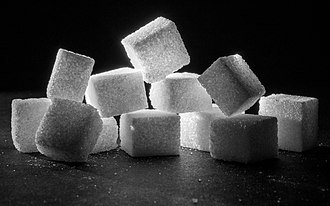Bob
Have a question related to this hub?
Alice
Got something to say related to this hub?
Share it here.



White sugar, also called table sugar, granulated sugar, or regular sugar, is a commonly used type of sugar, made either of beet sugar or cane sugar, which has undergone a refining process. It is nearly pure sucrose.
The refining process completely removes the molasses from cane juice or beet juice to give the disaccharide white sugar, sucrose. It has a purity higher than 99.7%.[1] Its molecular formula is C
12H
22O
11.[2] White sugars produced from sugar cane and sugar beet are chemically indistinguishable: it is possible, however, to identify its origin through a carbon-13 analysis.[1]
White sugar (and some brown sugar) produced from sugar cane may be refined using bone char by a few sugar cane refiners.[3] Beet sugar has never been processed with bone char and is vegan.[4] In modern times, activated carbon and ion-exchange resin may be used .
From a chemical and nutritional point of view, white sugar does not contain—in comparison to brown sugar—some minerals (such as calcium, potassium, iron and magnesium) present in small quantities in molasses.[5][6][7] The only detectable differences are, therefore, the white color and the less intense flavor.[7]
The overconsumption of white sugar (or any sugar) brings many health consequences,[8] including heart disease, obesity and type 2 diabetes. The CDC recommends limiting daily sugar consumption to less than 200 calories worth (about 12 teaspoons/48 grams) on a 2000 calorie diet.[8]